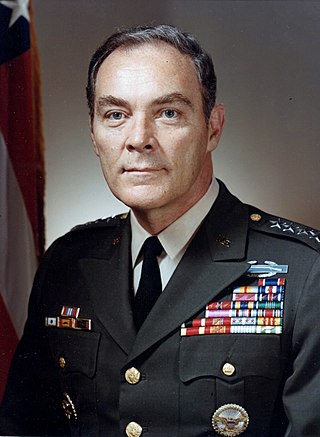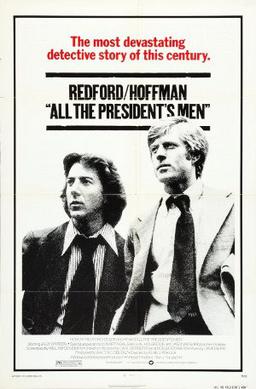
George Herbert Walker Bush was an American politician, diplomat, and businessman who served as the 41st president of the United States from 1989 to 1993. A member of the Republican Party, he also served as the 43rd vice president from 1981 to 1989 under Ronald Reagan and previously in various other federal positions.

The Watergate scandal was a major political scandal in the United States involving the administration of President Richard Nixon which began in 1972 and ultimately led to Nixon's resignation in 1974. It revolved around members of a group associated with Nixon's 1972 re-election campaign breaking into and planting listening devices in the Democratic National Committee headquarters at the Watergate Office Building in Washington, D.C., on June 17, 1972, and Nixon's later attempts to hide his administration's involvement.

Alexander Meigs Haig Jr. was United States Secretary of State under president Ronald Reagan and White House chief of staff under presidents Richard Nixon and Gerald Ford. Prior to and in between these cabinet-level positions, he was a general in the U.S. Army, serving first as the vice chief of staff of the Army and then as Supreme Allied Commander Europe. In 1973, Haig became the youngest four-star general in the Army's history.

Robert Upshur Woodward is an American investigative journalist. He started working for The Washington Post as a reporter in 1971 and now holds the honorific title of associate editor though the Post no longer employs him.

Carl Milton Bernstein is an American investigative journalist and author. While a young reporter for The Washington Post in 1972, Bernstein was teamed up with Bob Woodward, and the two did much of the original news reporting on the Watergate scandal. These scandals led to numerous government investigations and the eventual resignation of President Richard Nixon. The work of Woodward and Bernstein was called "maybe the single greatest reporting effort of all time" by long-time journalism figure Gene Roberts.

The Director of Central Intelligence (DCI) was the head of the American Central Intelligence Agency from 1946 to 2004, acting as the principal intelligence advisor to the president of the United States and the United States National Security Council, as well as the coordinator of intelligence activities among and between the various US intelligence agencies.

Deep Throat is the pseudonym given to the secret informant who provided information in 1972 to Bob Woodward, who shared it with Carl Bernstein. Woodward and Bernstein were reporters for The Washington Post, and Deep Throat provided key details about the involvement of U.S. president Richard Nixon's administration in what came to be known as the Watergate scandal. In 2005, 31 years after Nixon's resignation and 11 years after Nixon's death, a family attorney stated that former Federal Bureau of Investigation (FBI) Associate Director Mark Felt was Deep Throat. By then, Felt was suffering from dementia and had previously denied being Deep Throat, but Woodward and Bernstein then confirmed the attorney's claim.

In political studies, surveys have been conducted in order to construct historical rankings of the success of the presidents of the United States. Ranking systems are usually based on surveys of academic historians and political scientists or popular opinion. The scholarly rankings focus on presidential achievements, leadership qualities, failures, and faults. Popular-opinion polls typically focus on recent or well-known presidents.

The Watergate scandal refers to the burglary and illegal wiretapping of the headquarters of the Democratic National Committee, in the Watergate complex by members of President Richard Nixon's re-election campaign, and the subsequent cover-up of the break-in resulting in Nixon's resignation on August 9, 1974, as well as other abuses of power by the Nixon White House that were discovered during the course of the scandal.

The Final Days is a 1976 non-fiction book written by Bob Woodward and Carl Bernstein about the Watergate scandal. A follow-up to their 1974 book All the President's Men, The Final Days concerns itself with the final months of the Presidency of Richard Nixon including battles over the Nixon White House tapes and the impeachment process against Richard Nixon.

A speechwriter is a person who is hired to prepare and write speeches to be delivered by another person. Speechwriters are employed by many senior-level elected officials and executives in the government and private sectors. They can also be employed to write for weddings and other social occasions.

All the President's Men is a 1976 American biographical political thriller film about the Watergate scandal that brought down the presidency of Richard Nixon. Directed by Alan J. Pakula, with a screenplay by William Goldman, it is based on the 1974 non-fiction book by Carl Bernstein and Bob Woodward, the two journalists investigating the scandal for The Washington Post.

State of Denial: Bush at War, Part III (ISBN 0-7432-7223-4) is a 2006 book by Bob Woodward that examines how the George W. Bush administration managed the Iraq War after the 2003 invasion. It follows Woodward's previous books on the Bush administration, Bush at War and Plan of Attack. Based on interviews with a number of people in the Bush administration, the book makes a number of allegations about the administration.
Alicia Cobb "Lisa" Shepard was an American journalist, media writer and expert on the work and lives of Bob Woodward and Carl Bernstein.
This bibliography of Richard Nixon includes publications by Richard Nixon, the 37th president of the United States, and books and scholarly articles about him and his policies.

On April 22, 1994, Richard Nixon, the 37th president of the United States, died after suffering a significant stroke four days earlier, at the age of 81.

The Reagan era or the Age of Reagan is a periodization of recent American history used by historians and political observers to emphasize that the conservative "Reagan Revolution" led by President Ronald Reagan in domestic and foreign policy had a lasting impact. It overlaps with what political scientists call the Sixth Party System. Definitions of the Reagan era universally include the 1980s, while more extensive definitions may also include the late 1970s, the 1990s, and even the 2000s. In his 2008 book, The Age of Reagan: A History, 1974–2008, historian and journalist Sean Wilentz argues that Reagan dominated this stretch of American history in the same way that Franklin D. Roosevelt and his New Deal legacy dominated the four decades that preceded it.
Gerald Ford was the 38th president of the United States, serving from 1974 to 1977. After his tenure's end, Ford was active in the public sphere, traveling, writing a memoir, and voicing his opinion about contemporary issues within the United States and abroad.

Fear: Trump in the White House is a nonfiction book by American journalist Bob Woodward about the presidency of Donald Trump. The book was released on September 11, 2018. Woodward based the book on hundreds of hours of interviews with members of the Trump administration. The book's publisher Simon & Schuster announced that it had sold 1.1 million copies in the first week of its release, making it the fastest selling opener in the company's history.















